Deputy Prime Minister Chrystia Freeland has revealed that Canada and its allies are considering taking decisive trade action against China and Indonesia in a bid to counter the tightening grip of the Asian nations on the global nickel market. This move comes as Indonesia’s share of global nickel output soared from 7% to a staggering 55% in the past decade, predominantly under the control of Chinese-affiliated mining companies with links to Beijing’s authoritarian government.
The surge in Indonesian nickel production, largely facilitated by China, has led to a drastic drop in nickel prices, plummeting over 80% from a peak of US$100,000 a tonne to around US$19,100 a tonne. Speaking to reporters in Toronto after addressing the First Nations Major Projects Coalition conference, Freeland expressed concerns over the intentional market manipulation by these countries, which threatens the viability of Western mining operations and raises national security issues.

“It is our belief that that behaviour can be intentional, can be happening with the purpose of driving companies in our country, [and] in those of our allies, out of business,” said Freeland. “That is not good for our economies. It’s not good for our national security.”
Freeland emphasized Canada’s active engagement in exploring domestic and collaborative measures with democratic partners to address this critical issue.
The urgency of securing Western supply chains in critical minerals against adversarial nations was underscored in a recent meeting of finance ministers from the Five Eyes alliance, comprising Australia, New Zealand, Canada, the United States, and Britain. The repercussions of the nickel price crash are already evident, with major producers like First Quantum Minerals, Glencore, and Wyloo Metals halting operations and issuing bleak forecasts.
Earlier this year, BHP Group Ltd., headquartered in Melbourne and recognized as the world’s largest mining company by market value, revealed a recent estimate indicating that approximately half of the world’s nickel production is operating at a loss.
Moreover, the environmental toll of China and Indonesia’s nickel production surge cannot be overlooked. The heavy reliance on thermal coal for power in these countries exacerbates carbon emissions, further amplified by the processing of nickel pig iron for use in industries like electric vehicles.
Indonesia’s history of anti-competitive trade practices, such as the 2020 export ban on raw nickel, has drawn international scrutiny, with the European Union lodging complaints with the World Trade Organization.
Canada’s federal government has previously voiced apprehension regarding China and Indonesia’s dominance in the nickel market. In March, Federal Natural Resources Minister Jonathan Wilkinson highlighted the supply surge orchestrated by China and Indonesia, suggesting it facilitated market manipulation.
In addition to nickel, China has secured a commanding position in various critical minerals, including lithium, cobalt, and graphite. These minerals play pivotal roles in electric vehicle batteries and other forms of low-carbon energy sources.
Information for this briefing was found via The Globe And Mail and the sources mentioned. The author has no securities or affiliations related to this organization. Not a recommendation to buy or sell. Always do additional research and consult a professional before purchasing a security. The author holds no licenses.









